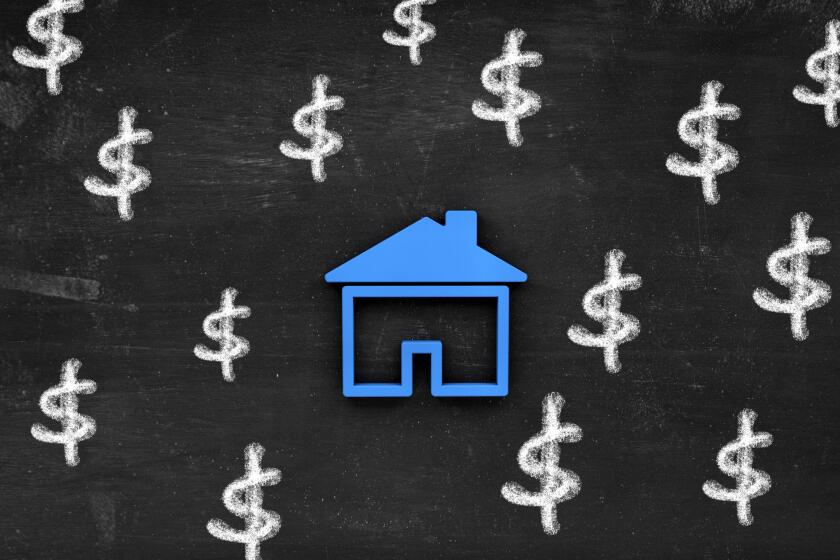Column: California’s usury law caps loan rates. Bizarrely, most lenders are exempt

Rae Walker is scratching her head over her credit card bill.
“I noticed,” she told me, “that the interest charged exceeds what appears appropriate for California’s usury law,” which caps the allowable interest rate for consumer loans at 10%.
Why, the Woodland Hills resident wonders, is she being charged a rate of 23% on her card.
“They’re breaking the law, aren’t they?”
The answer is yes, in theory. And no, in point of fact.
I get asked frequently about California’s usury law. It’s an especially timely topic in light of Thursday’s Senate Banking Committee hearing about establishing a national 36% rate cap for loans.
Not to mention that Americans are now borrowing more than ever before.
Consumer debt soared to $14.64 trillion in the first three months of the year — fueled in large part by mortgages, auto loans and the perennial problem of $1.7 trillion in outstanding student borrowing.
The average credit card interest rate in California and nationwide is 16.16%, according to CreditCards.com.
Yet Article 15 of the California Constitution declares that no more than 10% a year in interest can be charged for “any loan or forbearance of any money, goods or things in action, if the money, goods or things in action are for use primarily for personal, family or household purposes.”
“Things in action” doesn’t refer your cat chasing a laser pointer around the living room. It’s a legal term for something owed to a creditor under a lawsuit.
Before we get to why California’s usury law isn’t worth the paper it’s printed on, here’s some helpful context. The Merriam-Webster dictionary defines “usury” as:
1: The lending of money with an interest charge for its use, especially the lending of money at exorbitant interest rates.
2: An unconscionable or exorbitant rate or amount of interest, specifically interest in excess of a legal rate charged to a borrower for the use of money.
The problem isn’t new. As Exodus 22:25 states: “If thou lend money to any of my people that is poor by thee, thou shalt not be to him as an usurer, neither shalt thou lay upon him usury.”
Leviticus 25:36 makes God’s feelings even plainer: “Take thou no usury of him.”
Which is to say, according to the Bible, charging people high interest for loans is a sin.
It’s an admonishment, however, that many people of faith choose to ignore, particularly those in the Republican Party who are vehemently opposed to any form of financial regulation. Bad for business, you could say.
What should shock Californians is a loophole in the state Constitution specifying that the usury law’s 10% rate cap doesn’t apply to “any bank created and operating under and pursuant to any laws of this state or of the United States of America.”
In practice, according to the California attorney general’s office, this means any loan from a bank, savings and loan, credit union, finance corporation or even a pawnbroker is exempt from the usury law.
Which is to say, most companies licensed to lend money to consumers in California aren’t covered by the primary state law that specifically addresses the lending of money to consumers in California.
If that’s not a Catch-22, I don’t know what is.
L.A. County Assessor Jeff Prang says bulk appeals by tax agents cost his office $2.2 million a year and may mean $15 million lost in annual revenue.
In fact, it’s hard figuring which loans are subject to the usury law. Some (but not all) loans secured by real estate may fall under the law’s complicated provisions. Some (but not all) loans for buying or improving property may be covered.
“Californians had strong consumer protections in place decades ago — specifically, a constitutional usury cap of 10%,” said Graciela Aponte-Diaz, director of federal campaigns for the Center for Responsible Lending.
“Through a process of deregulation in the 1980s and ’90s, the cap no longer applies to regulated financial institutions,” she told me. “Since then, predatory lending has proliferated in the state.”
I asked the American Bankers Assn. for comment. The trade group hooked me up with Alan Kaplinsky, a lawyer who is credited with having “pioneered” arbitration clauses in consumer contracts that prevent people from suing banks and other businesses.
Not surprisingly, Kaplinsky told me that “Californians have sufficient safeguards” from usurious interest rates and that “there’s no evidence of banks in California gouging consumers.”
Wells Fargo customers might have something to say about that.
A majority of Americans say they’ve been having trouble sleeping since the start of the pandemic. Fixing that, experts say, won’t be easy.
In any case, federally chartered banking heavyweights can shrug off state usury laws thanks to the National Bank Act of 1863, which generally prevents states from telling big banks how to conduct their business.
And like a rancid cherry atop a melting sundae, the U.S. Supreme Court ruled in 1978 that a bank can charge all customers, no matter where they’re located, whatever rate is allowed by the bank’s home state.
This prompted South Dakota to throw out its own usury law and invite lenders to set up shop there. The state is now home to the credit card operations of Citi, Wells Fargo and Capital One, among others.
Delaware wasted no time in trashing its usury law as well. The state now hosts the credit card operations of Bank of America, Chase and Discover.
Stir payday lenders into the mix, and you can see why some Democratic lawmakers say it’s time for a national rate cap. Annual interest rates for payday loans can top 400%.
Under the proposal discussed at Thursday’s Senate Banking Committee hearing, a 36% rate cap that currently applies to loans extended to members of the military would be put in place for all consumers.
Critics of such a move, including trade groups representing financial services, say a 36% national rate cap would be harmful to consumers.
The Credit Union National Assn. joined other financial organizations in telling lawmakers that “many consumers who currently rely on credit cards or personal loans would be forced to turn elsewhere for short-term financing needs,” including “loan sharks, unregulated online lenders and the black market.”
Consumer advocates find such sky-is-falling claims laughable.
“Usury caps of around 36% are the most effective way to stop predatory small-dollar loans,” said Aponte-Diaz at the Center for Responsible Lending. “And stronger limits are essential on larger loans.”
Linda Jun, senior policy counsel at Americans for Financial Reform, told me “a triple-digit interest rate shouldn’t be allowed anywhere.”
“A national rate cap will protect all consumers in the United States from this kind of abuse,” she said.
A Highland Park man, who says he hasn’t smoked for 25 years, was told by Hertz to pay a $400 fee after workers claimed they smelled cigarettes.
I think we can do even better. States shouldn’t be prevented from safeguarding their residents because of a federal banking law dating from the Civil War.
Congress should update the National Bank Act to permit states to implement their own, tougher consumer protections. And California lawmakers should close the loophole that gives most lenders a get-out-of-jail-free card from the state’s usury law.
Moreover, Congress should undo that weaselly Supreme Court decision that created usury havens for lenders. It was a boon to banks but did consumers no favors.
In short, Rae Walker, there’s nothing illegal about that 23% interest rate on your credit card.
But our state Constitution clearly intended things to be different.










